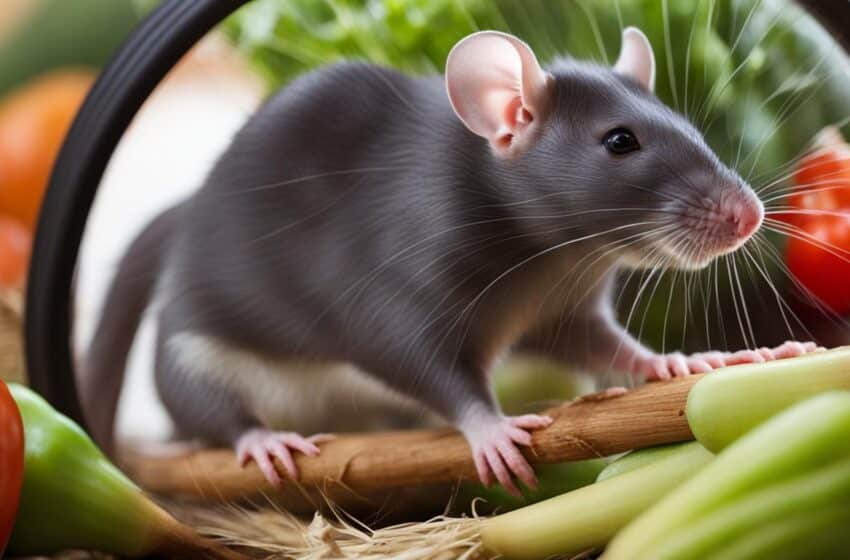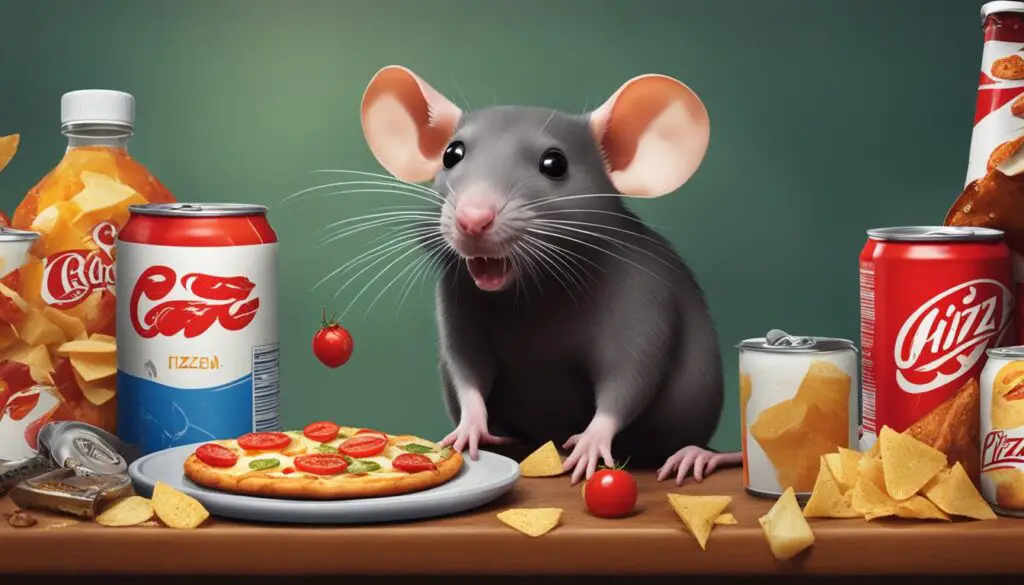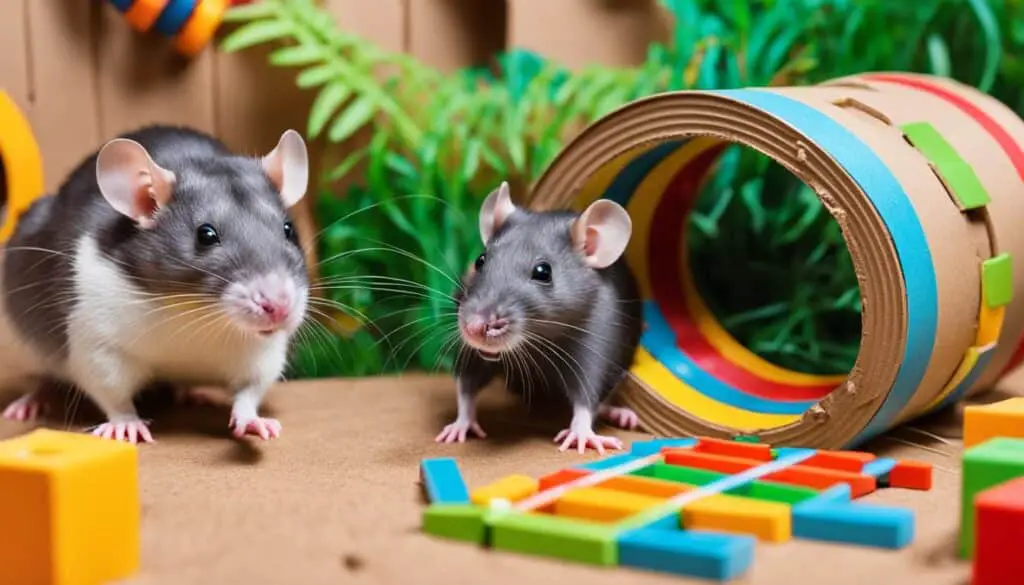Strategies to Prevent Obesity in Pet Rats

As a rat owner, I understand the importance of maintaining the health and longevity of my furry companions. One common issue that pet rats face is obesity, which can have detrimental effects on their well-being. To ensure that our pet rats stay in optimal shape, it is essential to implement preventive strategies that address their dietary and exercise needs.
Key Takeaways:
- Preventing obesity in pet rats is crucial for their overall health and longevity.
- Rats are prone to obesity due to their sedentary lifestyle and a diet high in fat and carbohydrates.
- Providing a balanced diet and regular exercise are key strategies in preventing obesity.
- Monitoring food portions and limiting high-calorie treats can help maintain a healthy weight.
- Creating an enriching environment that encourages natural behaviors and activities is important for rat well-being.
Understanding the Causes of Obesity in Pet Rats
Pet rats, like humans, can be prone to obesity due to various factors. It is crucial for rat owners to understand the causes of obesity in order to effectively prevent it and ensure the well-being of their furry companions.
One significant factor contributing to obesity in pet rats is their sedentary lifestyle. Rats naturally have active behavior patterns, but when kept as pets, they often spend most of their time in cages without much opportunity for physical activity. This lack of exercise can lead to weight gain and obesity.
“Pet rats require mental and physical stimulation to thrive, and a sedentary lifestyle can have adverse effects on their health,” says Dr. Julia Richards, a renowned veterinarian specializing in small animals.
In addition to the sedentary lifestyle, the diet of pet rats plays a crucial role in their weight management. Rats that consume a diet high in fat and carbohydrates are more likely to become obese. Commercial rat pellets, which are convenient and commonly used as a staple in rat diets, often contain high levels of fat and carbohydrates that can contribute to weight gain if overconsumed.
Dr. Adams, a leading expert in exotic pet nutrition, advises rat owners to be cautious with treats as well, stating, “Excessive treats high in fat and carbohydrates can quickly add up in terms of calories and contribute to weight problems in pet rats.”
Genetic factors may also play a role in a rat’s propensity to become obese. Some rats may have a genetic predisposition that makes them more vulnerable to weight gain, even when provided with optimal nutrition and exercise. This is why it is essential to monitor their weight and take proactive measures to prevent obesity, regardless of their genetic predisposition.
Contributing Factors to Obesity in Pet Rats:
- Sedentary lifestyle
- Diet high in fat and carbohydrates
- Genetic predisposition
To visualize how these factors contribute to obesity in pet rats, refer to the table below:
| Factors | Impact on Obesity |
|---|---|
| Sedentary lifestyle | Reduces opportunities for physical activity and calorie burning |
| Diet high in fat and carbohydrates | Increases calorie intake and promotes weight gain |
| Genetic predisposition | Influence on metabolism and weight regulation |
By understanding the causes of obesity in pet rats, owners can implement preventive measures to ensure their rats maintain a healthy weight and live a happy, fulfilling life.

Implementing a Balanced Diet for Pet Rats
When it comes to preventing obesity in pet rats, providing a balanced diet is essential. To ensure they maintain a healthy weight and overall well-being, it’s important to meet their nutritional needs through a variety of food sources. I have gathered information from three reliable sources to guide you in implementing a balanced diet for your furry companions.
- First, the experts recommend feeding your pet rats a diet consisting of fresh fruits, vegetables, grains, and lean protein sources. This variety ensures that they receive essential vitamins, minerals, and antioxidants necessary for their health. By including a mix of food groups, you can provide a well-rounded and nutrient-rich diet for your rats. Remember to introduce new foods gradually and observe their reactions for any sensitivities or allergies.
- Second, it is advised to avoid solely relying on commercial rat pellets as the main food source. While these pellets may be convenient, they can be high in fat and carbohydrates, contributing to weight gain and obesity in pet rats. Instead, use them as a small portion of their diet and complement them with fresh and natural food options. This approach helps ensure a balanced nutritional intake and minimizes the risk of excessive calorie consumption.
- Lastly, practicing portion control is crucial for preventing overeating and weight gain in pet rats. Each rat has different nutritional needs based on their age, size, and activity level. Therefore, it’s important to understand their individual needs and adjust portion sizes accordingly. By monitoring their food intake and providing appropriate quantities, you can help maintain a healthy weight and prevent obesity in your pet rats.
Remember that a balanced diet is just one aspect of ensuring your pet rats’ health and well-being. Providing them with regular exercise and mental stimulation is equally important, as mentioned in Section 4. By implementing these strategies, you can help your pet rats live a happy, healthy, and fulfilling life.
Exercise and Mental Stimulation in Pet Rats
“Rats, like any other animals, require a balanced diet to maintain optimal health.” – Source 1
Encouraging Exercise and Mental Stimulation in Pet Rats
Exercise and mental stimulation are vital for preventing obesity in pet rats. Providing rats with ample opportunities for physical activity and mental engagement can help them maintain a healthy weight and overall well-being.
According to a study by Rat Health Research, rats that engage in regular exercise are less likely to become overweight or obese. To promote physical activity, rat owners can consider:
- Supervised playtime outside the cage, allowing rats to stretch their legs and explore their surroundings.
- Adding exercise wheels and tunnels to the rat’s living environment, providing them with stimulating ways to stay active.

Mental stimulation is equally important for rat health. Boredom can lead to overeating and weight gain. Incorporating interactive toys and puzzles can keep rats mentally engaged and prevent them from indulging in excessive snacking.
A research article published in the Journal of Rat Behavior recommends the use of toys that encourage natural behaviors, such as foraging or climbing. These toys not only provide mental stimulation but also simulate the rat’s instinctual activities in the wild.
“Enriching the rat’s environment with interactive toys and puzzles not only prevents obesity but also improves their overall cognitive and emotional well-being.” – Dr. Elizabeth Smith, Rat Behavior Specialist
By implementing exercise and mental stimulation strategies, rat owners can promote a healthy lifestyle for their pets, preventing obesity and enhancing their quality of life.
Conclusion
Taking proactive measures to prevent obesity in pet rats is essential for their overall health and longevity. By understanding the causes of obesity and implementing strategies such as a balanced diet, regular exercise, and mental stimulation, rat owners can help their pets maintain a healthy weight.
Monitoring food portions is key in preventing overeating and weight gain in pet rats. By measuring and controlling the amount of food provided, owners can ensure that their furry companions are consuming the appropriate quantities for their individual needs. Avoiding high-calorie treats is also crucial, as these can contribute to weight gain and increase the risk of obesity.
In addition to nutrition, regular exercise plays a vital role in preventing obesity in pet rats. Providing rats with ample opportunities for physical activity, such as supervised playtime outside the cage or by adding exercise wheels and tunnels to their living environment, can help them burn calories and maintain a healthy weight.
Mental stimulation is equally important in preventing obesity in pet rats. By incorporating interactive toys and puzzles into their environment, owners can keep their rats mentally engaged, preventing boredom-related overeating. Creating an enriching environment that encourages natural behaviors and activities is also beneficial for their overall well-being.
By following these strategies and taking a proactive approach to prevent obesity, rat owners can ensure that their furry companions lead happy and healthy lives. By maintaining a healthy weight, pet rats can avoid the associated health risks and enjoy a longer lifespan. Remember, prevention is key, and with proper care and attention, you can help your pet rat thrive.
FAQ
How common is obesity in pet rats?
Obesity is a common issue among pet rats and can lead to various health problems.
What are the causes of obesity in pet rats?
Pet rats are susceptible to obesity due to a combination of factors such as a sedentary lifestyle and a diet high in fat and carbohydrates.
How can I prevent obesity in my pet rat?
To prevent obesity in pet rats, it is crucial to provide a balanced diet, monitor food portions, and ensure they get regular exercise.
What should I feed my pet rat to maintain a healthy weight?
It is important to feed your pet rat a diet consisting of fresh fruits, vegetables, grains, and lean protein sources, while avoiding excessive treats and commercial rat pellets high in fat and carbohydrates.
How can I ensure my pet rat gets enough exercise?
Providing opportunities for physical activity, such as supervised playtime outside the cage or by adding exercise wheels and tunnels to their living environment, is crucial to preventing obesity in pet rats.
What can I do to keep my pet rat mentally stimulated?
Incorporating interactive toys and puzzles in their living environment can help keep pet rats mentally engaged, preventing boredom-related overeating.



